"An Alien Afternoon with Tony Banks" - Tony talks to TWR about the new
Genesis album at The Farm, August 22, 1997. Interview by Alan Hewitt
and Simon Pound, with photographic assistance from Ian Jones.
| TWR: Obviously, Phil decided to quite in 1993.
How long after that did you and Mike decide to carry on and get stuck
into this new album?
TB: Well, we let it ride for a little bit because we felt that
Phil was probably going to leave, but rather than forcing the issue, we
thought we would leave it until it was 100% definite. I think we had decided
as early as 1993 although that might have been when it was likely to happen,
and there was an official announcement between ourselves in the summer
of 1995. I am not very good with my years so I might be a year out! (laughs).
So, we had already decided by then that Mike and I thought we would
like to try and carry on by certainly seeing what we got out of the writing
stage, and seeing what was produced. And we hadn't any idea how we were
going to cope with the obvious lack of a singer etc, but we decided that
we would give it a go as we had nothing to lose. I thought Mike might
not be too keen because The Mechanics was going very well but he was definitely
up for it. I could have gone either way but there is a challenge about
it that quite appealed to me. Apart from anything else, we obviously wanted
to keep on writing so we made that decision. We actually started doing
it in January (of '96) and consequently, having made that commitment to
start in January, we waited to see how it would go. |
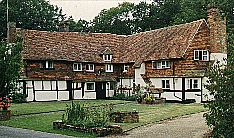 The Farm
Picture courtesy of Ian Jones/TWR
The Farm
Picture courtesy of Ian Jones/TWR |
| TWR: When you actually decided to continue and get
into the new album, did you have any idea then what you were looking for
in terms of a new singer for the band? |
TB: No, we made ourselves no rules, but there were certain things that
I think Genesis can't do without, and we have certain agreements about taste
and the sort of singers we like. So, the main thing , the certainly very crucial
things you have with both Phil and... well, Peter always had it but Phil sort
of developed it, which was an ability to have a second gear in their voice where
they just add that passion. You think they are going full steam ahead and suddenly
a little bit more comes in and that is so crucial to the way we do it. The drama
of the music requires that, so that was probably our only aspect of it. We don't
really like... I don't particularly like heavy vibratos and I don't like vocal
histrionics, so that limits you a surprising amount actually, when you are listening
to all the people we listened to, which was just about anything we could lay
our hands on. You could rule out about 90% because the voice just wasn't right.
The main thing being that they just didn't have that ability to switch on
when required. I really didn't think it would be as easy as it ended up being
in a way, because Ray, when I originally heard that Stiltskin album, I thought
the voice... I really thought it was... I really liked the way it sounded at
times on that album. But having been through this quite a few times on solo
albums, normally you get these guys down that can't really do anything like
the range you need. So, as soon as I heard this album I thought "this guy sounds
great, if he can sound like that it'll be fantastic..." Also the other thing
is that, obviously at this stage we didn't know if he wanted to do it, so that
was another factor because... not everybody... obviously in certain areas, our
name is mud so you don't really know how people are going to respond until suddenly
they are asked to do it. We auditioned four people down here in the end, two
of which were people we had really chosen through the tapes we had heard, and
the other two were really there for other reasons because they suggested that
they had other advantages about them that made them attractive, but we didn't
really think that those two actually had the voice, so we really only found
two voices out of all the people we listened to.
TWR: We were fascinated that the band seemed to want somebody without
any "history", which we think is a very brave move, was this deliberate?
TB: I don't say that it was deliberate, but I think we always
felt that we didn't want it to come out like a supergroup or something.
We wanted, very definitely, the group to carry on having that kind of
character it has, and if you can imagine any singer you care to name,
whether they would or wouldn't do it is irrelevant, but if you said Steve
Winwood with Genesis, or Sting with Genesis, or whatever it happened to
be you would say it is something else entirely. So we didn't consider
singers like Steve Winwood... We wanted somebody like Ray, Ray was good
because he had had enough experience so you felt that he had done it in
front of a big audience and he had proved that he had something of that...
I think we were initially going for the voice and he was the voice out
of everything I had heard personally I liked the best of all, and so it
was quite lucky that the rest of it fell into place. Obviously there are
limitations to his voice as well, I am not saying that it is absolutely
perfect in every sense, it isn't, but then neither was Pete's and nor
was Phil's. So you have a compromise in certain areas but you pick up
other strengths.
TWR: Presumably one of the compromises is going to have to be
having to perform certain songs in different keys which, I think, is going
to be interesting for us...?
TB: Well it is less of a problem than you probably think, as
we did a lot of songs onstage in different keys over the years. Right
from the beginning, even when we did "Supper's Ready" onstage we used
to change the key of the last section and so you have to sort of do this
and I think with Ray being, in general, about a tone lower than Phil...
and there are songs like "I Can't Dance" for example which we did a tone
down on stage and we might be taking it down even further down. |
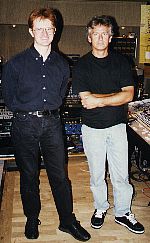 Simon Pound and Tony Banks
Picture courtesy of Ian Jones/TWR
Simon Pound and Tony Banks
Picture courtesy of Ian Jones/TWR |
What is interesting in the way some of the songs sound, some songs he is capable
of doing as a reasonable mimic of Pete, no problem, of Phil sometimes too almost
in a way if you want that. I mean, when you go to a concert you don't want to
hear everything sung completely differently.. It's like going to see a covers
band or something... there are one or two songs that do change quite a lot and
some of those will be quite interesting to see whether they turn out better
for that, some of the slightly bluesier songs like "Abacab" or even "That's
All" sounded quite interesting with his voice because he gives it a new character.
But when he sings something like "No Son Of Mine" he has got very much his own
character on it, it sounds... it's sort of like Phil but I think he sounds really
good singing that song and, in fact, it is one of the ones that impressed me
the most when he sang it originally.
TWR: How much of the album had actually been written before Ray was
finally taken on board?
TB: Well, we had written really all of the music, all the basis for
the songs. We had left it very open in terms of... we didn't really define melody
lines more than we had to and certainly no lyrics were written before Ray was
on the scene. Also with the structure of the songs left very open because we
were using this "radar" system which is a digital kind of thing so you are not
just stuck with tape so you can put bits in front, in different orders and cut
bits out or add things. We purposely did that before we hired the system...
we got it to that which meant that you could construct the thing a little bit
so... some of it sounded stronger and you could make more of that a bit and
less of that and all the rest of it which was a really useful tool with our
not knowing the singer, I think that made a big difference.
TWR: Can you run us through the album track by track, Tony?
TB: Right, well the most obvious thing is that Ray's voice is more...
deeper and therefore has this darker quality about it. I think it gives a little
more of the drama that people obviously associate with us, a little bit less
poppy. A lot of that is down to his voice I think, although the songs... perhaps
there are a few more of what you might calls lightly longer songs, you know
of six, seven even eight minutes in length. We have been pleased with the response
of the people who have come down to interview us so far... "Calling All Stations"
is the opening track and it was the first thing we wrote... most of the elements
of that were there on day one. There was a certain... what became the middle
part later on. We really just set up the rhythm and just played on it and there
really is this endless chord sequence, this is very much a chord sequence based
piece and all these chords just sounded really good on it, you know, dramatic
types of things. It was a question of trying to put them in an order that gave
some kind of sense as a song because there's virtually no repetition in the
song, there is a little bit of repetition at the end but for the first four
or five minutes of the song there is no actual repetition and yet it seems to
hang together very well.
I think it is a dark and dramatic and slow tempo sort of piece. It is Ray's
favourite track on the album. We wanted to put this first because it gave a
slightly heavier elemental edge to the album and first tracks make a lot of
difference. We wanted this to come across more as a rock album, so it has got
a heavy guitar riff at the front of it and as I say, lots of dramatic chords.
Mike wrote the lyric on it and melodically Mike had various vocal ideas and
we got Ray singing them and then we tried to make it so that his voice sounded
right on them. We were very much experimenting with his voice to see what we
could get out of it and some melodic lines were better than others so we shaped
the melody very much around his voice.
| "Congo" is the second track, the single version is an
edit down although they sometimes play both versions because they are
on the single and it developed out of a loop that I was fiddling around
with. I was combining two or three different things together and slowing
them down and doing funny things with them and it just had a really good
feel to it I thought, so we ended up having two completely different moods
on this loop, one of which was very much a happy thing which was kind
of more obvious because it suggested slightly African beats or that Caribbean
feel and you could see that.
The other thing was this much darker thing which was much more straight
ahead, more rock and we just combined the two really. I must admit that
when we were writing this and I had just heard the Stiltskin album and
I said to Mike: "This would sound fantastic, get that singer from Stiltskin,
this sounds exactly like one he would sing..." (laughter) and I just sang
what was really quite a straight bluesy kind of melody on it and I said,
"That will sound really good, it'll work..."
TWR: The video was a different kind of video for Genesis... |
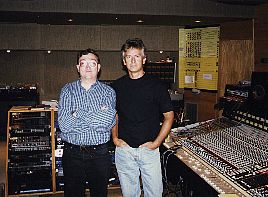 Alan with Tony Banks
Picture courtesy of Ian Jones/TWR
Alan with Tony Banks
Picture courtesy of Ian Jones/TWR |
TB: it was really the first time ever that we let a director have his
way with us because we had quite a lot of respect for the guy as a film maker
and it was quite fun to do although I haven't got a clue what it is about but
it looks good! (laughs). Certainly nothing to do with what the lyrics are about!
(laughs).
The third track, "Shipwrecked" interestingly enough came from another loop
but one which I just recorded. What I did was, we have DATs all the time of
things as we go along and there was a little bit in that song that became "Anything
Now", there was just a little riff that Mike played.. and almost in a sense...
just so that I could put a tag on it. I clipped it out and put it on the Emulator
because I thought it was a good little bit and then one time I played it back
slow speed on one of those things that are so easy to do on those keyboards.
I just thought it sounded fantastic. So I looped it, as I do (laughs). And I
played it to Mike and I said: "You're going to love this" and quite obviously,
he loved it because it was him! (laughs). It was just another riff, a transient
riff in a long twenty five minute improvisation. It was a riff he played twice
in the thing and he did it and sounded really good.
We just played it back and it had some magic about it. We were a bit stuck
with some of the elements in it so what we did was overdub guitars, slowed down
guitars on it, to make the riff itself seem a bit more prominent but we still
couldn't get it to sound as good as the original loop, so the original loop
is quite loud and then it was a simple matter of writing a song on it that had
the same... you know... I wrote a very simple verse and middle eight for it,
just something to take it away and bring it back. Again, Mike wrote the lyric
to this one and we actually thrashed out a melody for this one because the initial
melody that Mike had, I think wasn't quite right, so I tried another completely
different one and some parts of that worked and so we ended up combining the
two and got a result. It was originally called "1965" because it has... it has
that very strong nostalgic feel about it and I think it is the most obvious
single on the album for me but some people said it was too soft and wasn't enough
of a break from the ... you know, we wanted to establish ourselves with something
different because with Phil, the ballads were quite a strong feature. I never
saw it as a ballad really, just more of a sort of song, like a Beatles song
or something in the sense that it is just a song, you don't really think of
them as ballads.
"Alien Afternoon"... what happened on this one was, Mike had a drum pattern
that was quite interesting and I just played on it. We probably had more than
this, we probably had three or four bits that worked on it and I had these two
bits and I thought that both of them were really strong in a different way.
Mike was particularly keen on what ended up on the second part of it and it
was just that there wasn't a way you could really make a song out of them and
say that's one chorus to the other's verse, they were two separate entities.
So the idea was to have a kind of link and I had this odd chord sequence that
went with the second half but wasn't really part of anything, so that was used
as the bridge between them. It was just a matter then of working out a lyric
that would combine the two very different styles. The second bit is an obvious
live bit. If it doesn't send a shiver down your spine when we do that change
into the final chord of the last section when it goes into the major key, then
it hasn't worked. Yeah, hopefully it should be a very strong visual song...
it is very deceptive because it is a very simple pattern and yet somehow, it
sounds special and you don't know why that is just that it has that quality
about it and I suppose it is a classic Genesis bit. It has got all the hallmarks
and I think that is what we do best, that is what Genesis music is all about..
it sends a shiver down your spine at those moments... I think it will be good
live, especially when the spaceship lands! (laughs).
"Not About Us" was all of us really, but Mike.. every time
he played the opening sequence which, once again, was very simple... a
couple of chords, but it just sounded very good, very evocative, and on
the tape when you always came across it on the working tape, it just sounded
really good so we wanted to keep that acoustic feel I wrote the chorus
part, the chords and everything for it to go with but a large amount of
the melody on this during the verses, came from Ray when he was down here
the second time when he was auditioning, and we were making him sing a
Blues on top of these various bits we had written and one of them was
that piece and he pretty much sang what became the first verse. So, to
a large extent we used that, and Mike wrote a chorus to go with it, melody
and stuff. A lot of people like this track because... I think it is less
of a typical Genesis song in many ways, and I think it takes us more towards
mainstream.
With the next one, "If That's What You Need", again it was another song
that somebody developed out of one of those loops in a similar situation
to "Shipwrecked". Just a little bit which we made something of and wrote
and wrote the chords on top of it. Again, Mike wrote a kind of romantic
lyric on top of it and I suppose it is more in the tradition of "Follow
You Follow Me" and that kind of thing, more than other things but I think
it works, and I actually prefer that to "Not About Us" myself. I think
it is a better song but they are both more straightforward things. The
album tends to get heavier as it gets going, I think. |
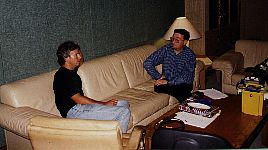 Alan with Tony Banks
Picture courtesy of Ian Jones/TWR
Alan with Tony Banks
Picture courtesy of Ian Jones/TWR |
TWR: Was that a deliberate choice, Tony, because the running order
we had originally, ended with "The Dividing Line" which to us makes perfect
sense, really...
| TB: We originally thought...I was in favour of having
"The Dividing Line" at the end but the feeling was that a lot of people
didn't listen to albums as consecutively as they used to, and in that context
we wanted to make sure that they got to that song not too late because it
is the most strongly instrumental and playing kind of biased song on the
album, and so we swapped "One Man's Fool" and "The Dividing Line". "The
Dividing Line" is the end of side one if you look at it from the old vinyl
point of view, and obviously, I said it is the strongest instrumental and
it particularly features the drummer, Nir. When we originally did this with
the drum machine we originally had a very clattery sort of drum machine
part that worked really well and the working title was NYPD which was because
of the way the drums were very fast! (laughs).
"Uncertain Weather" is what you might call a more traditional Genesis
big ballad type thing really, strong chords. This is one Nick D'Virgilio
does the drums on which are really nice and I think we ended up using
his part. We did get Nir over at one point to try... we thought at one
point we would only use Nir and copy the part but it didn't sound nearly
as good as when Nick did it. It is a lighter touch which seemed to work
really well on this song I think. And yes, what can I say about it? I
think it is a recognisable Genesis-type piece.
"Small Talk" is the other track with "Not About Us" which I think is
more mainstream. It has as a basis quite a simple guitar riff which had
quite a good feel to it and I played the sax on top of it which gave it
quite a good character, I think. This is a song that Ray wrote all the
melody and lyrics to. The best thing about it for me is the line "Small
Talk" itself which has just got a great sound to it. It is a kind of three
part harmony thing. He has got a great low voice when he sings an octave
below his own voice, he gives it quite a growl which we use a lot on the
album. |
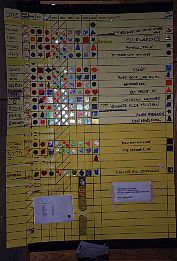 The "working titles" board for "Calling All Stations"
The "working titles" board for "Calling All Stations" |
So, then there is "There Must Be Some Other Way" which in some ways is one
of my favourite tracks on the album. I think it is really a big ballad with
an extended instrumental middle section. There is probably the one thing...
if people have a criticism of this album who are long time Genesis fans. I think
they would say there aren't enough instrumentals on this album, and that is
fair criticism I think. But there is a bit on this in the middle of this, that
is recognisably Genesis... that kind of thing. It is a song with a very sad
lyric really, about divorce and things like that but it has a... I think Ray...
the chorus on this... I mean, I wrote the lyrics to this but I used what Ray
came up with on the chorus fairly spontaneously again, when we were doing this
improvisation early on... and he just sang... "There must be some other way"
and it sounded so good and I thought I have got to use that as the basis. And
so we did, and we thought what it could be about and modified it a bit to make
it work. It is what you might almost call a piece of straightforward rock singing
on the chorus... it is not original but it is something that he does so well
you have just got to use it. You have got to harness it and you don't need to
write a great melodic line, it just sounds so good and it has a lot of passion
to it.
That brings us to the final track, "One Man's Fool" which is, I suppose it
is the most distinctive Genesis track on the album in some ways. I think it
is because it has all the elements. It is quite long, quite a lot of aspects
to it and quite a heavy lyric...
TWR: Can you tell us what the lyric is actually about, Tony...?
TB: Well, the first half is really dealing with terrorism I suppose.
The idea of someone who is obviously... when you watch a TV programme when you
see the news and you see all this misery and destruction an everything, and
you know that obviously someone watches that and thinks: "That's a job well
done... I'm really pleased with that..." And it is difficult to know... it is
difficult to get inside that person's brain to feel what it is that is important
enough for them to make them feel that this is worth doing, causing all this
misery. So the first half deals more with that.
The second half really deals with that... extends the idea a bit further really,
dealing with certain people, people who are certain about things, how can you
be so sure? I have always had a mistrust of certainty and the second half deals
with that but it deals with it in a more philosophical manner so it is less
personal, it is less intense. Musically I thought it was one of the most interesting
things, the second half...there are some nice little chord changes in there
and a strong feel and I used a lot of this octave vocals from Ray which I think
sound really strong. It sounds a little like Pete, I suppose when he does that
but it has just got a strong character. So, that is pretty much it, really.
That wraps up our in depth look at Calling All Stations for this issue.
Next time round we will have some of Tony's views on the UK music press and
a look at what the new Genesis tour holds for the fans. Until then it only remains
for us to say our "thank you's" to the people who made this possible... First
of all, my thanks to Simon and Ian without whom I would not have reached The
Farm in the first place, and especially to Simon who actually enabled TWR's
editor to physically almost be in two places at the same time! My continuing
thanks to Tony for giving up so much of his precious time to talk to us at such
length. To Carol Willis for arranging the interview for us and for her patience
- I hope you enjoyed the chocolates and the wine, Carol? Thanks also to Dale
Newman for his additional enthusiasm and entertainment- good luck with the CD
project! Finally, my thanks to Tom and Pat Pound whose fantastic show of hospitality
ensured that yours truly was at least vaguely compos mentis when he arrived
to do this interview!




